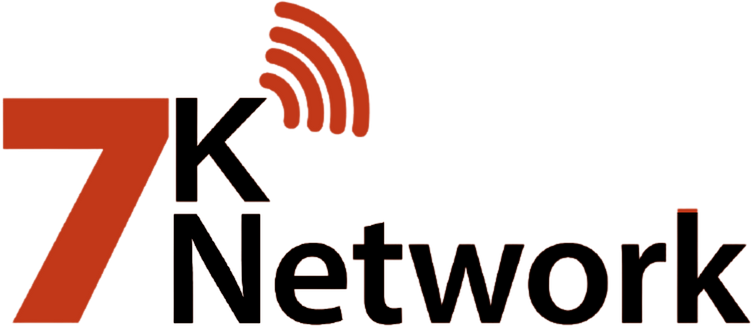Enterprise Resource Planning (ERP) software is highly vital for any business with the objective of handling various activities, improving productivity, and maintaining a competitive edge. The ERP system enables an organization to integrate its core business functions, such as finance, inventory management, human resources, and customer relationship management into a single platform. This then enables decision-making and achieves operational efficiency.
However, the many choices make this a hectic process. This article takes you through the top 15 ERP software solutions, which have their features, benefits, and suitability for different industries and business sizes to help you make an informed decision that can support your organization’s growth and success.
What is an Enterprise Resource Planning Software?
Enterprise Resource Planning (ERP) software is a complete system that integrates and manages the core business processes of an organization. It is a centralized platform that connects different departments, including finance, supply chain, human resources, manufacturing, and customer relationship management (CRM). ERP software streamlines operations by automating workflows, reducing redundancies, and providing real-time data insights for better decision-making.
ERP solutions can be cloud-based, on-premise, or hybrid, providing scalability and customization to meet the unique needs of businesses of all sizes and industries. ERP software is an essential tool for modern business management, enhancing collaboration, improving efficiency, and optimizing resource utilization. Similar to Google Analytics services, ERP software provides data-driven insights to optimize business operations and decision-making.
How ERP Systems Improve Operational Efficiency
1. Centralized Data Management: ERP integrates all the business functions; hence all departments get to share the data in real time, reducing the duplication of data and errors.
2. Automated Processes: Invoicing, payroll, and inventory management are all automated routine processes that save a lot of time and reduce manual effort.
3. Real-time Reporting and Analytics: It gives the appropriate information to make the right decisions and respond promptly in line with any change in market conditions.
4. Better Coordination: Through ERP, there is increased information flow among teams, and that in turn results in increased coordination and efficiency of workflow among departments. Integration tools like BOL API further enhance coordination by enabling seamless data exchange between logistics systems and other business functions, ensuring smoother operations and faster decision-making.
5. Inventory Optimization: It enables monitoring the levels of inventories, orders, and deliveries. Thus, the incidence of stockouts is averted at the same time while getting rid of excess inventories.
6. Better Customer Service: With CRM being incorporated with ERP, there will be improved customer insight, provision of personalization of service, and quick responses.
7. Compliance and Risk Management: ERP supports the successful maintenance of compliance with the industry standards, minimizing risks of fines and errors.
8. Cost Reduction: ERP reduces operational costs through the optimization of processes by using the resources effectively and enhancing supply chain efficiency.
Top 15 Best Enterprise Resource Planning Software
1. SAP ERP
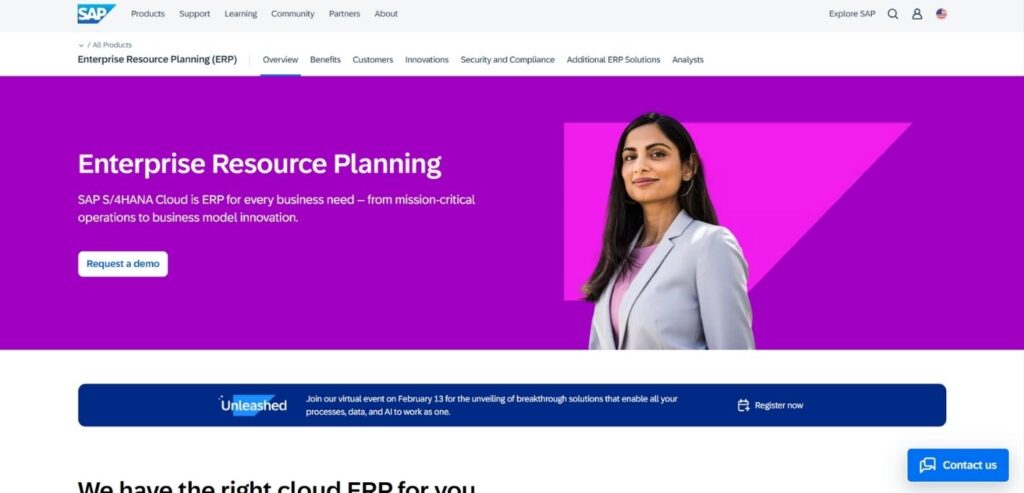
SAP ERP is an integrated software solution specifically developed to support organizations and manage most of their key processes in real time. It links different business processes including finance, logistics, people management and acquisition. SAP ERP has a feature that supports clear and specific areas of business, such as proven accounting, inventory, sales, and customer service.
Flexible and fairly modular, it may meet the needs of any organisational form, although, perhaps, it is even more suitable for large companies with a vast amount of processes and procedures. SAP ERP provides real-time information, increases working efficiency, helps save time and money but at the same time is very expensive and cumbersome to implement if proper guidance is not taken.
Features:
Pros:
Cons:
2. Oracle ERP Cloud
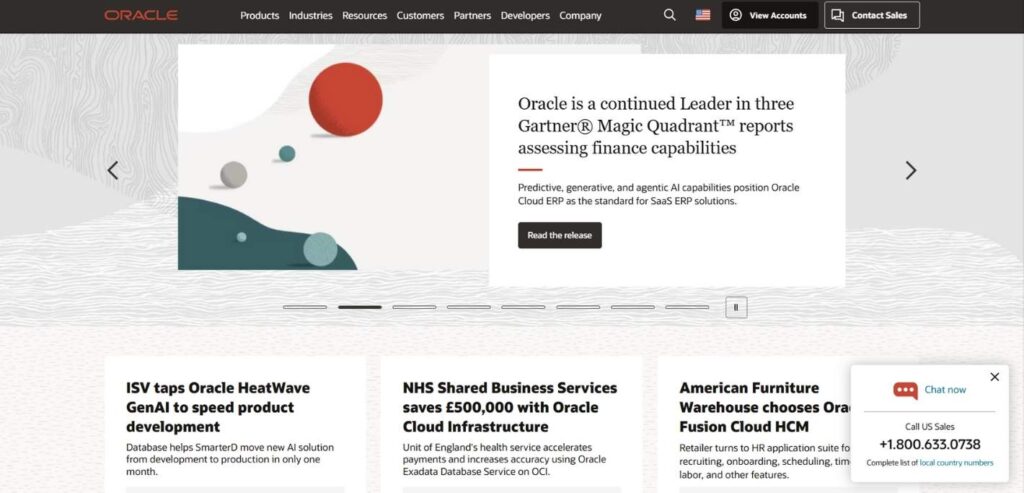
Oracle ERP Cloud is a fully functional, cloud-based, ERP solution, built for managing all aspects of business and is suitable for businesses of all sizes. It uses real-time data and artificial intelligence making it easy for businesses to make decisions, and run their operation efficiently and economically. Normal features like effortless workflows, prescient estimations, and pliable descriptions give Oracle ERP Cloud the leverage to engage the fluctuations in the market and fuel the growth of the business.
It is flexible, reliable, easy to access and can support any kind of business organization, therefore it fits small, medium and large companies. As with most technologies that provide great features, it may also be somewhat clunky, and potentially impractical for all but the largest enterprises to own and operate.
Features:
Pros:
Cons:
3. Microsoft Dynamics 365
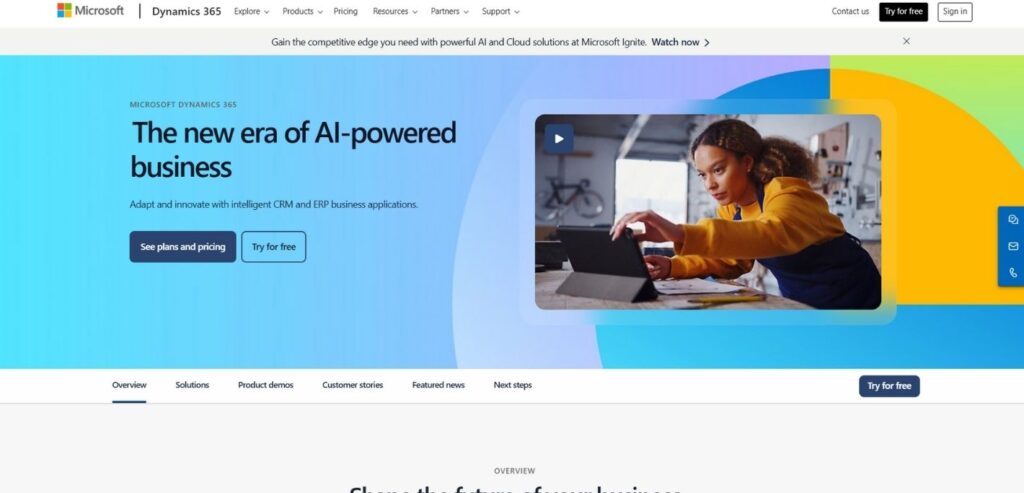
Microsoft Dynamics 365 is a comprehensively integrated ERP/CRM application hosted in the cloud, making it an ideal solution for businesses exploring the differences between Dynamics 365 CRM vs ERP functionalities. It unifies several business aspects including sales, customer support, marketing, accounting and supply chain on one platform. Microsoft Dynamics 365 relies on AI, data and Analytics, as well as, machine learning in making decisions, streamlining work processes, as well as in improving customer relations.
It is highly flexible and extendible and as such it is very useful for large and small companies alike. It nicely integrates with Microsoft products such as Office 365 which gives a complete solution for enhancing the performance, cooperation and success of all business processes.
Features:
Pros:
Cons:
4. NetSuite ERP
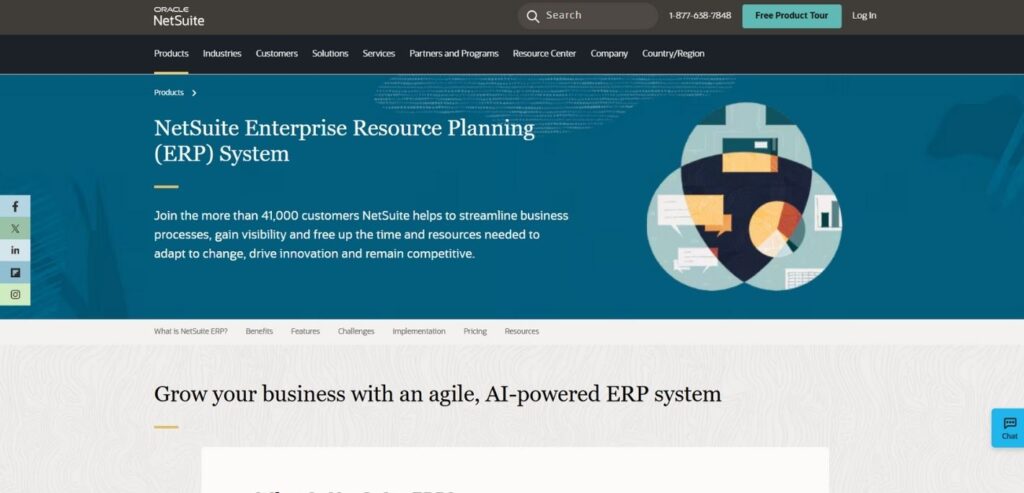
NetSuite ERP is an integrated, Web-based enterprise resource management software that caters to businesses of all scales. It links some core business activities including; accounting, logistics, order processing, stocks, purchases, suppliers and customer care or CRM in a single solution.
NetSuite ERP delivers effective real-time information that assists organizations in attaining effective solutions to their problems related to operations. It has a centralized, open architecture, is easily scalable, and is accessible to team members offsite. As a cloud-based solution, considered by companies experiencing growth, NetSuite ERP is well-suited to verticals, but very expensive and complicated to install in small or midsize businesses.
Features:
Pros:
Cons:
5. Infor ERP
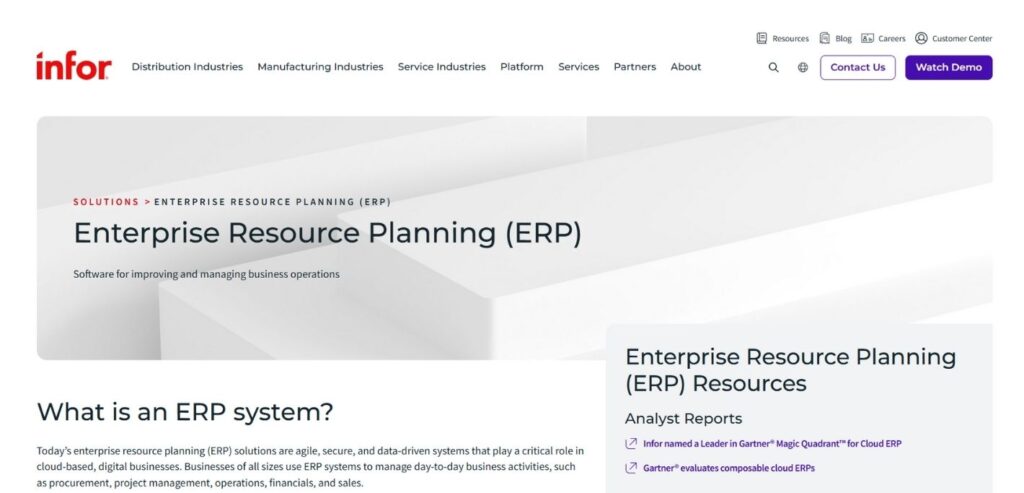
Infor ERP is cloud-based ERP software, focused on improving the business activities and processes throughout different industries and sectors such as manufacturing, health care, retail, distribution and other industries. As it is essentially a complex system of inventory management, procurement, supply chain, financing, and human resources management, it has to be a real-time analysis and reporting system.
Being an enterprise resource planning software, Infor ERP is designed to cater to businesses from diverse industrial sectors with enhanced organizational efficiency, optimized costs, and high productivity. Some of the benefits of Infor ERP include artificial intelligence, machine learning, and data analytics, which help work towards making informed decisions. It is highly flexible but can be confusing as well, and needs expertise in place to be used efficiently.
Features:
Pros:
Cons:
6. Epicor ERP
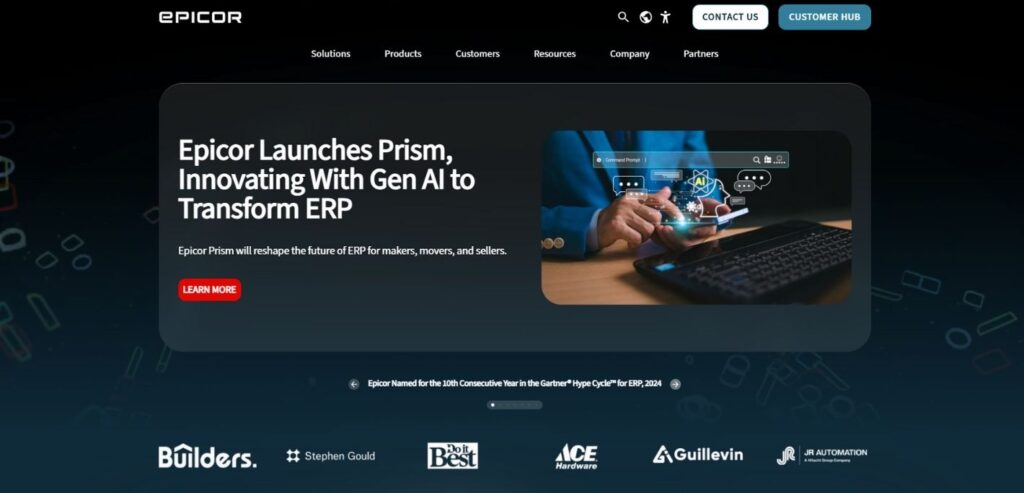
Epicor ERP is an integrated, global, industry-specific enterprise resource planning software that can help organizations control processes and decision makings. It connects major corporate operations including accounting, production, logistics, recruitment, and purchasing into a single solution.
There has been scalability of Epicor ERP, this means that it can suit all kinds of businesses, especially those in manufacturing and distribution. It also has some characteristics such as real-time analytics, cloud, and automation to enhance productivity and cut expenses. Despite these benefits, technical flexibility and relatively high prices may be problematic for a company of a less significant size during adoption and customization.
Features:
Pros:
Cons:
7. Odoo
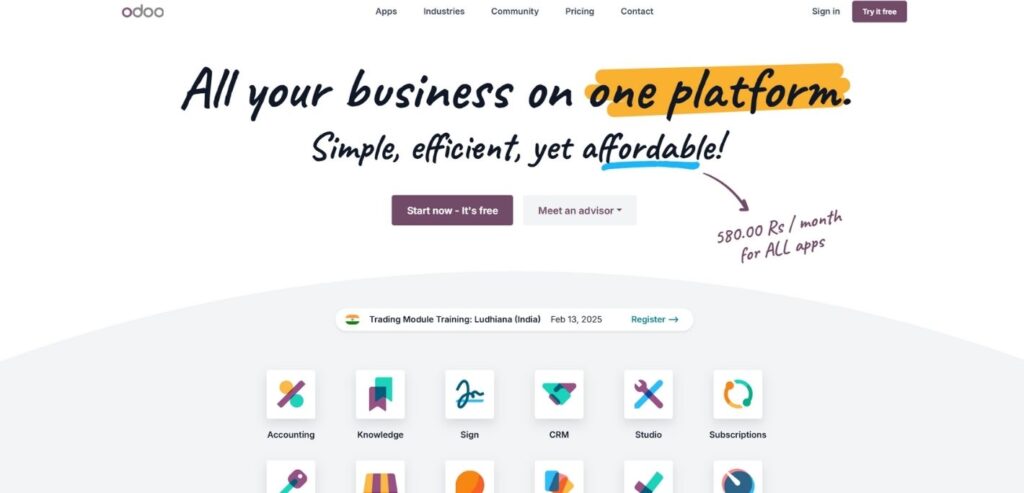
Odoo is an open-source ERP tool that provides organizations with a large number of applications for the successful management of sales, stock, accounts, people, and CRM. Odoo can be implemented based on modules where businesses can choose which aspects are relevant for their organizations; it means that the software can be used by small as well as giant firms.
It is easy to use and operates based on relatively self-explanatory menus and options of individual modules. Odoo is also available under the cloud model, so clients can easily access it at any time. While affordable for small businesses, it could need computer programming skills to develop complex layouts.
Features:
Pros:
Cons:
8. Sage ERP
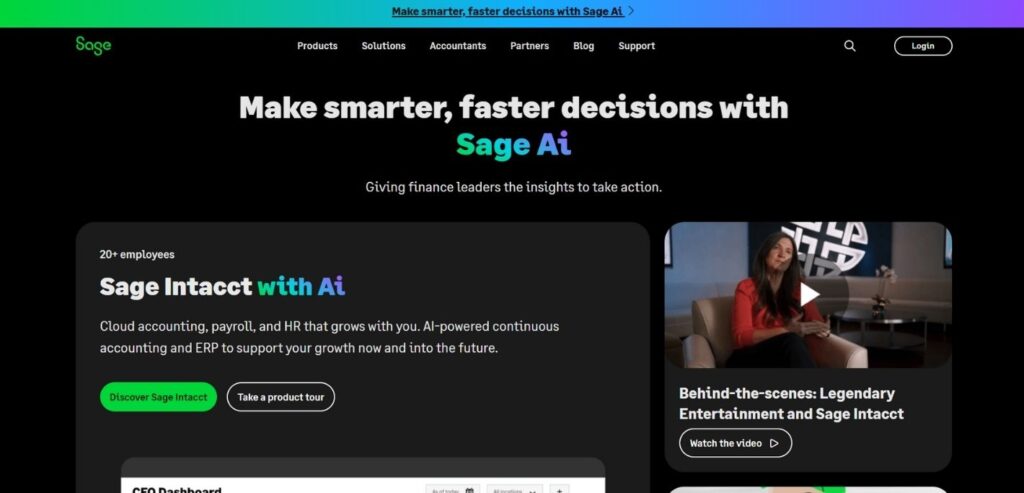
Sage ERP is one of the leading ERP software solutions that address the need to manage a company’s financial, supply chain, manufacturing, and human capital management. It offers functionalities for accounts, inventory, purchase, and sales order management which helps to monitor the business control procedures in real time.
Sage ERP is flexible and grows with business needs, demonstrating compatibility with small and mid-size companies in various industries. It is possible to implement the platform either on the premises or on the cloud making it easy to implement. Sage ERP is currently famous for being a product with well-developed accounting functionalities, though it may be less suitable for customization and integration for big or more complex companies.
Features:
Pros:
Cons:
9. Acumatica ERP
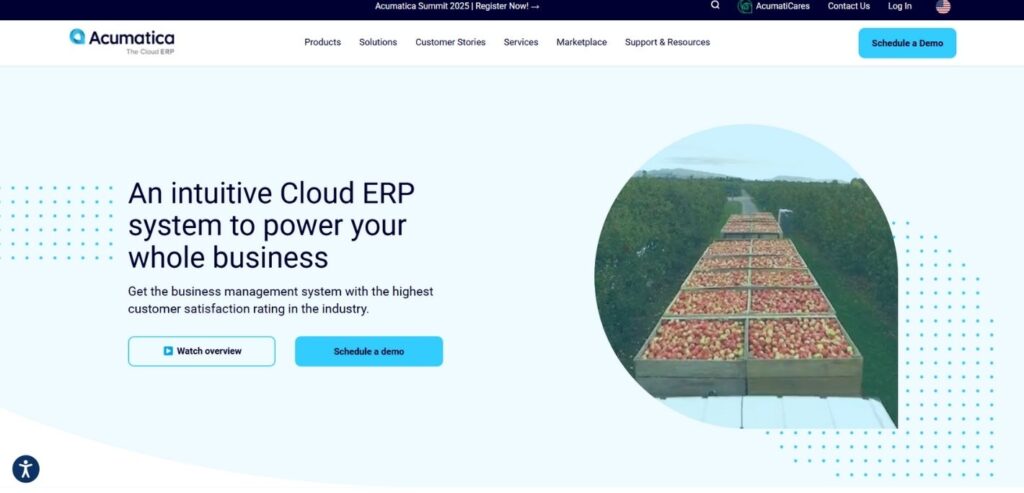
Acumatica ERP is an online Enterprise Resource Planning solution that targets the management of financials, distribution, inventory, project, and Customer Relationship Management (CRM) book. Easy to use with high scalability, making it ideal for companies from small to midsize across all the industry categories.
Real-time analytics, and automation besides providing full integration with other applications make Acumatica perfect. Cloud, on-premise hybrid, or hybrid, these flexibility strategies empower the business to grow and expand as they deem fit. Inexpensive and uncomplicated, Acumatica ERP streamlines operations, captures costs and facilitates effective decisions for a variety of companies.
Features:
Pros:
Cons:
10. IFS Applications
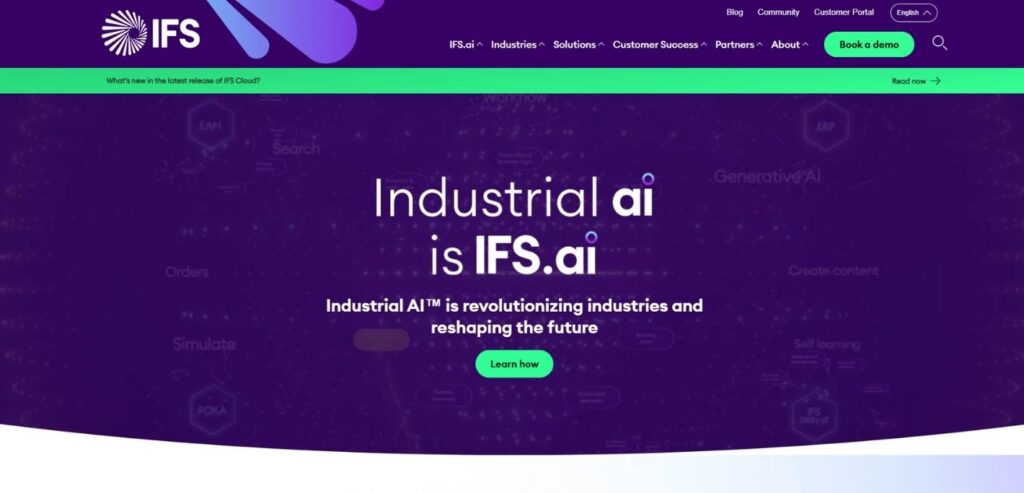
IFS Applications is the ERP suite in various industries including manufacturing, aerospace, defense, energy, and service management. It’s an integrated module set up in an organization encompassing key business functions such as financial management, supply chain, project management, human resources, and asset management.
IFS Applications are provided in flexible options that can be used on-premise, cloud, or hybrid deployment. The system has real-time insight and automated tools to support improving decision-making, operational efficiency, and satisfaction among customers. Its high degree of customizability, tailored to meet specific industry needs, may require special implementation and support for effective usage.
Features:
Pros:
Cons:
11. Syspro ERP
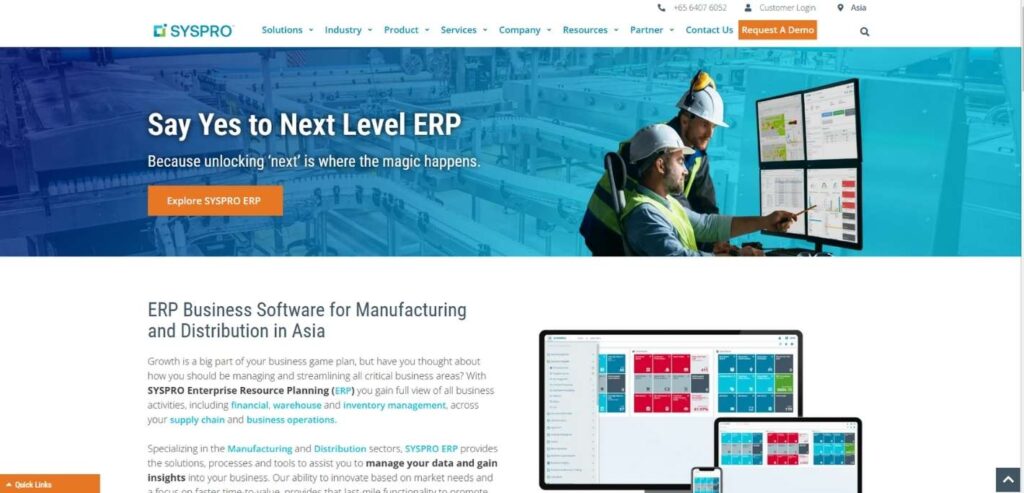
SYSPRO ERP is designed as an integrated enterprise resource planning system intended to make all business processes in the manufacturing, distribution, and retailing industries. Its comprehensive suite manages financials, inventory, the supply chain, production, and customer relationships.
SYSPRO ERP is primarily based on its user-friendly interface, scalability, and flexibility toward small-sized and mid-sized businesses. The platform offers real-time analytics, automation capabilities, and modules that can be customized according to specific industry needs. It offers deployment either on-premise or on the cloud. Considering its highly functional features, it might need dedicated technical support for personalization and prior setup.
Features:
Pros:
Cons:
12. Unit4 ERP
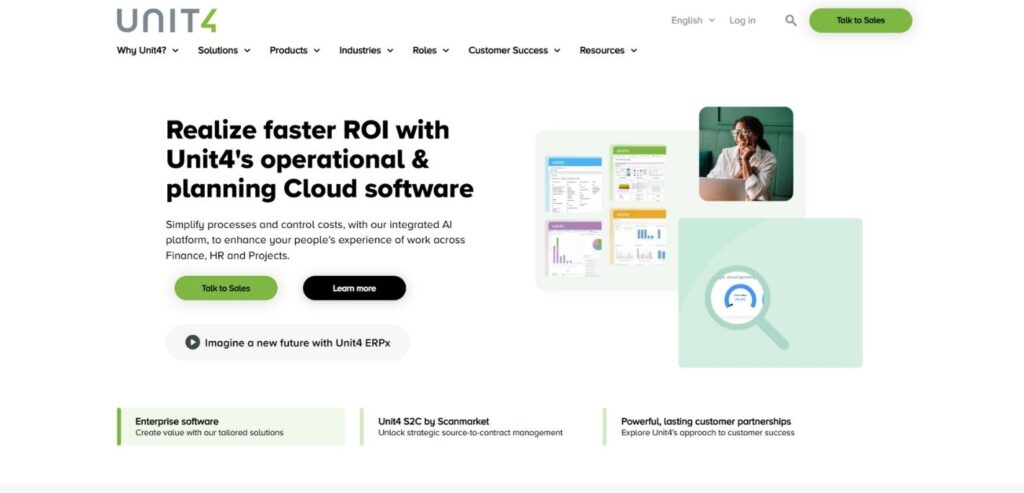
Unit4 ERP is a cloud-based enterprise resource planning solution that aids a business in automating and optimizing its core functions, including finance, human resources, procurement, project management, analytics, and others. The industry-specific modules offered cater to all such sectors such as education, professional services, and public services.
It is quite famous for its friendly interface that allows organizations to easily customize workflows and gain real-time insights for better decision-making. Unit4 ERP has good automation capabilities, reduces administrative work, and supports collaboration across teams. Although it is highly flexible, Unit4 ERP requires more support during the implementation process and is more applicable to service-based businesses rather than manufacturing.
Features:
Pros:
Cons:
13. Exact ERP
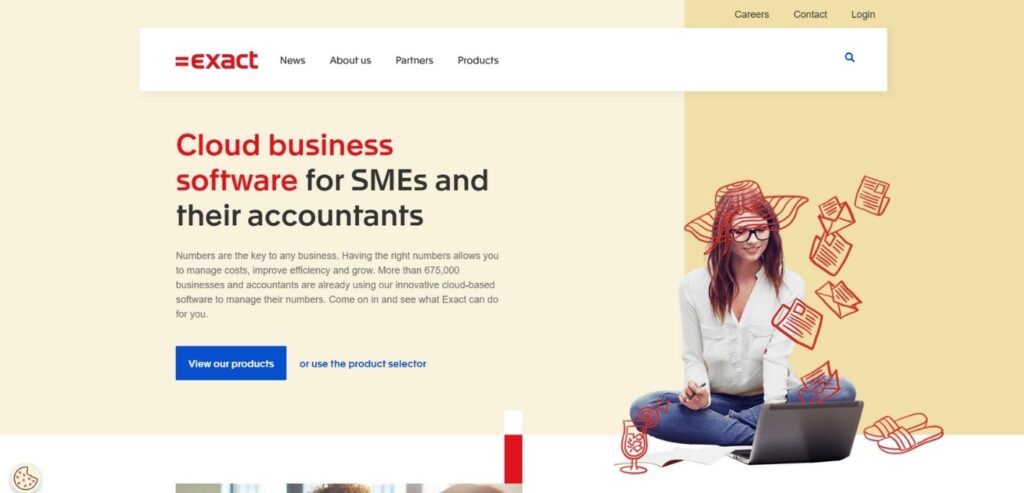
Exact ERP is a cloud-based enterprise resource planning solution designed for small to medium-sized manufacturing and distribution companies to streamline business operations. All the core activities, such as financial management, inventory control, supply chain management, production planning, and customer relationship management (CRM) are integrated into one unified platform.
This software offers analytics of real-time data, customization of dashboards, and reports to help customers make the most informed decisions. The platform has a user-friendly interface and flexible deployment options with the intent of helping businesses enhance efficiency as well as reduce operational costs. Nevertheless, it requires additional customization or training to fully access its advanced features.
Features:
Pros:
Cons:
14. Workday ERP
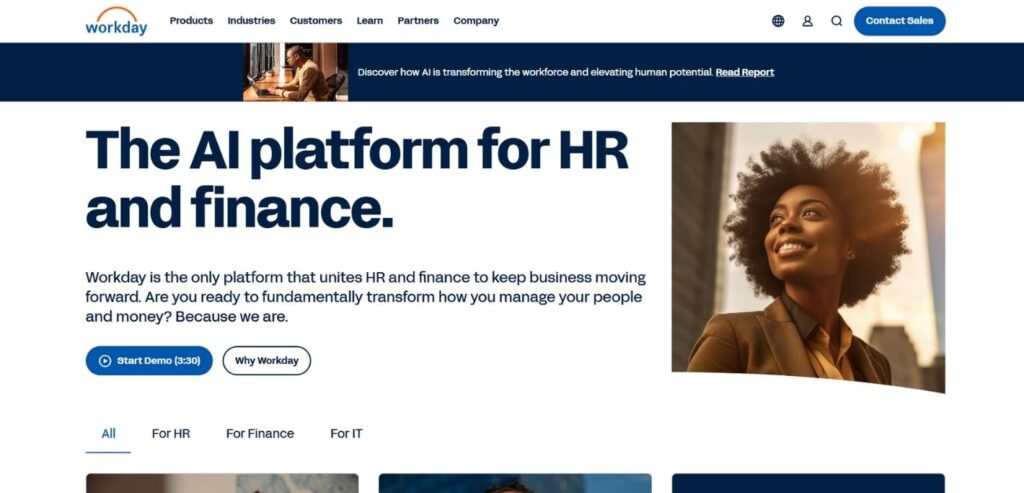
Workday ERP is a software program for enterprise resource planning primarily focused on human resources, finance, and planning. The major functions covered by the solution relate to payroll, talent acquisition, financial reporting, procurement, and employee engagement.
It is known for its intuitive and user-friendly interface as the data across all departments is integrated, and it gives real-time insights into the things going on for better decision-making. It uses AI and machine learning to automate many processes, lessen administration overheads, and better operational efficiencies. Workday ERP has scalability as well as flexibility, however, it can be very costly for small businesses as well and it is pretty demanding in terms of implementation and training.
Features:
Pros:
Cons:
15. Priority ERP
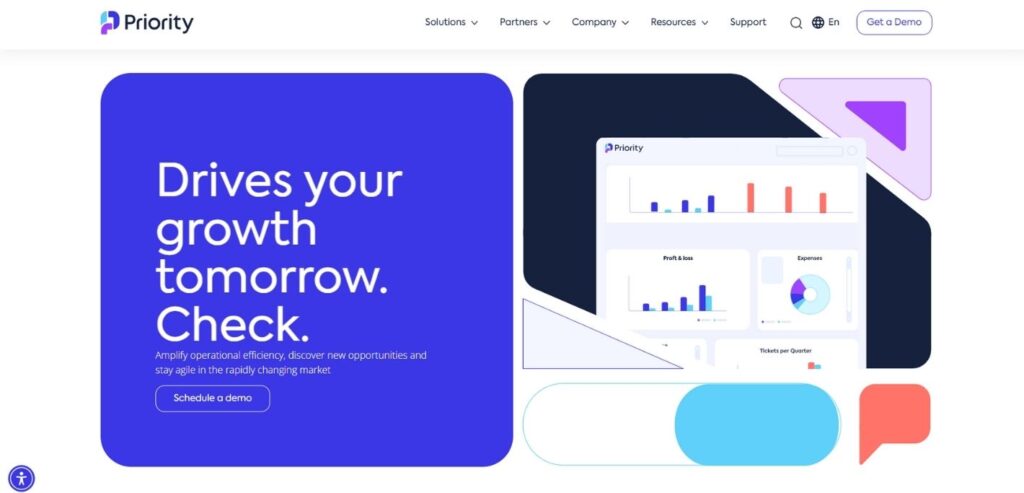
Priority ERP is the integrated, cloud-based enterprise resource planning system used to streamline company operations in almost all the finance, inventory, manufacturing, and sales functions with high customer relationship management (CRM) capabilities. Since it focuses more on flexibility and scalability, small and medium businesses in the following industries benefit much from this- manufacturing, retail, and distribution.
It facilitates real-time data, customizable workflows, and superior analytics for enhancing efficiency and supporting more informed decision-making. The platform allows for easy customizations and a modular structure that would allow businesses to choose only what they need from the feature sets. Some of the users will find it not easy to utilize without some sort of learning curve.
Features:
Pros:
Cons:
How to Choose the Right ERP System for Your Industry
- Centralized data management: All the business functions and departments will have access to their data in an ERP system in real time; there is zero duplication and zero error.
- Automating processes: Routine tasks like invoicing, payroll, and managing stock, are automated so time is saved, and manual efforts are reduced.
- Real-time reporting and analysis: This will help to access data immediately to help make more appropriate decisions faster as the responses in the markets come about.
- Better Collaboration: The data in the ERP can be passed across teams; therefore, a collaboration that facilitates the workflow with smooth running between departments and teams is made.
- Better Management of Inventory: This is because, in the avoidance of stockout and overstock, it tracks the inventory level, order, and deliveries.
- Customer Service: A CRM integrated creates a better understanding of ERP, so offers customized service with fast responses to the customer.
- Compliance and Risk Management: It ensures all industrial compliance to avoid the respective fines and mistakes that occur during that process.
- Cost Reduction: The ERP ensures that the operational cost is minimized by optimizing all processes, making resource allocation much better, and supply chain management much more efficient.
Conclusion
In summary, it has become inevitable for companies trying to cut operation costs, be more productive, and keep at par with a competitive edge over other players within today’s market to employ the ERP system of software. Through one common platform that brings in integrated finance, inventory, supply chain, and CRM functionalities, it has the advantage of enabling instantaneous decisions while controlling costs, and fostering cooperation across all departments.
Just like marketing project management tools, ERP softwares help the business across different sizes of organizations and their distinctiveness by being based either on cloud, premises or a flexible model that assists unique requirements. Long-term success along with growth therefore demands careful judgment for the appropriateness of the best ERP system choice by your business’ requirements.
FAQs
1. What is ERP software and why is it important?
ERP puts all core business processes into a central system, optimizing efficiency, redundancy elimination, and real-time analytics. It allows for the removal of friction across operations, quality decision-making, and collaboration and transparency between departments and departments.
2. Who could use ERP software?
ERP software is the best for any organization, irrespective of its size or industry type; it includes manufacturing, retail, healthcare, and services. For small businesses, it is scalable. Large enterprises manage complex operations on it.
3. What are the key features of ERP software?
Common features of ERP include: financial management, inventory tracking, human resources, supply chain management, customer relationship management (CRM), and real-time analytics.
4. What are some ways to choose the proper ERP for my business?
You will need to consider the industry-specific needs, scalability, ability to integrate with existing systems, deployment options (cloud or on-premise), user-friendliness, and cost before finally choosing an ERP system.
5. What are some common challenges related to ERP implementation?
The challenges include high upfront costs, time-consuming implementation, training employees, and proper data migration with existing systems. All these challenges can be avoided by choosing the right vendor and planning carefully.
